World
Serbia’s Lithium Summit: A Strategic Move for Europe’s Green Industry
Explore Serbia’s Lithium Summit, a pivotal event shaping Europe’s green industry. Discover how strategic partnerships and innovations in lithium production are setting the stage for sustainable growth and energy transition in the region.
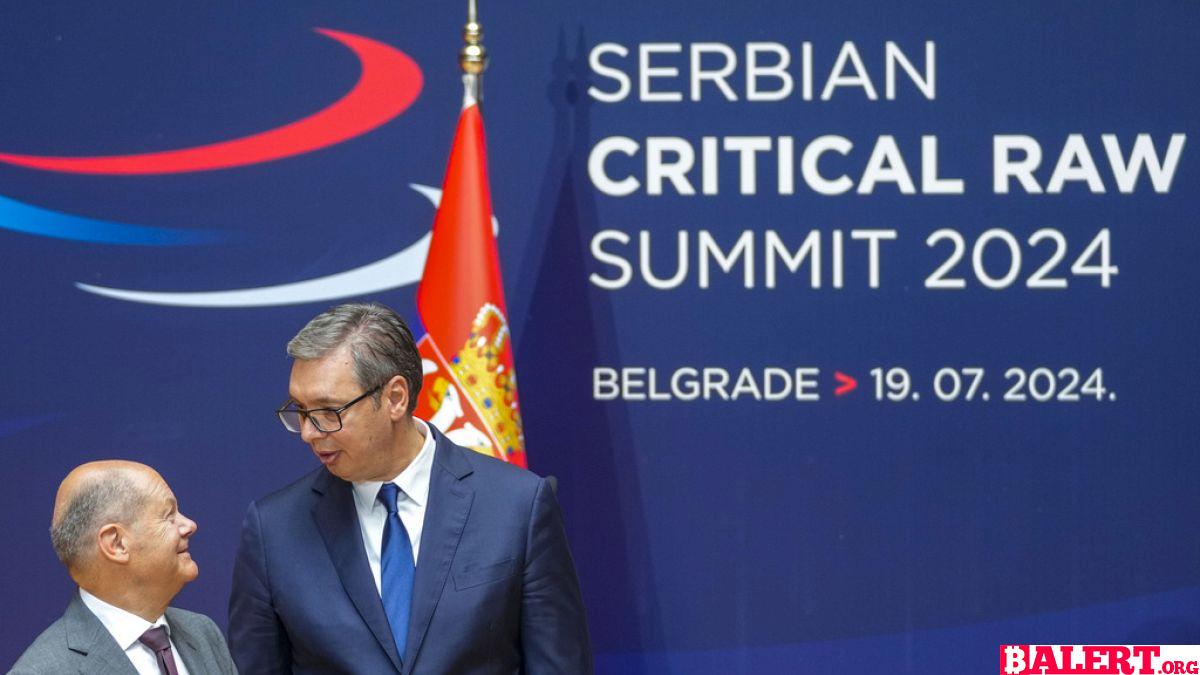
Serbia’s Strategic Lithium Summit: A New Chapter for Europe and the Balkans
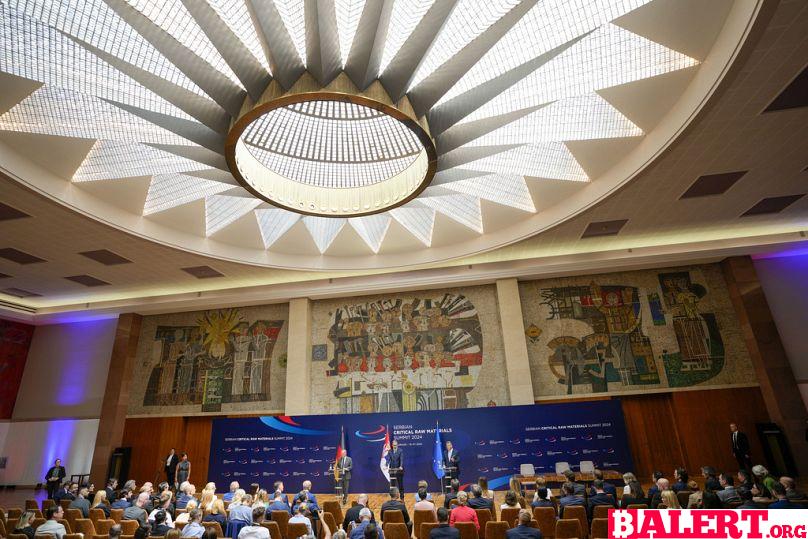
A rather sudden and low-profile meeting took place in Serbia’s capital last week. A delegation composed of high-ranking European officials and influential business leaders traveled to Belgrade for the discreetly titled “Summit on Strategic Raw Materials,” organized by the Serbian government. The event culminated in a single memorandum of understanding. However, this was no ordinary gathering; Serbia welcomed A-list guests including German Chancellor Olaf Scholz, European Commission Vice-President for the European Green Deal Maroš Šefčovič, and chief executives from major European banks, such as the European Bank for Reconstruction and Development, KFW, and the Italian Development Bank. Notably, the CEO of German automotive giant Mercedes-Benz was also in attendance.
What, then, brought these prominent figures of European politics and business to Belgrade? The memorandum that Šefčovič signed with Serbian Minister for Energy and Mining Dubravka Đedović Handanović may represent a pivotal development for Europe’s green industry and, undoubtedly, for Serbia’s economy as it strives to join the EU.
In Serbia, the memorandum has colloquially been dubbed “the lithium deal.” Serbian President Aleksandar Vučić emphasized the significance of the agreement during a press conference alongside Chancellor Scholz and Vice-President Šefčovič.
The Lithium Potential: A Resource for the Future
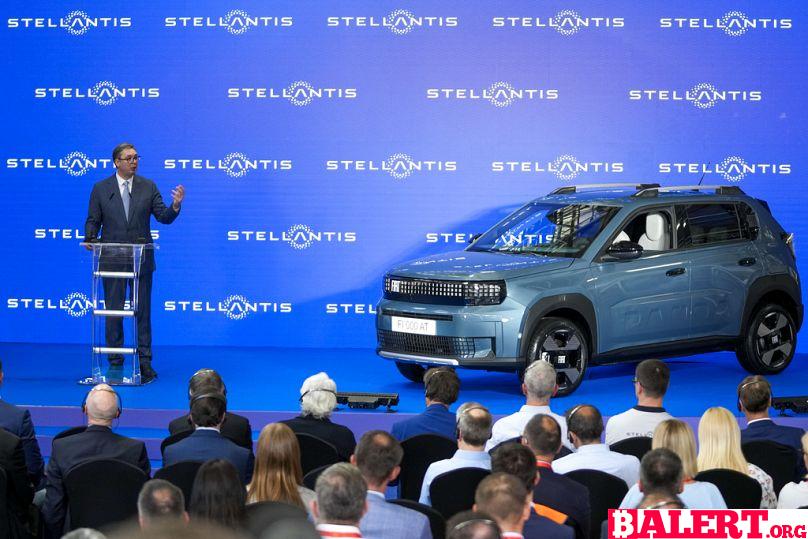
Global mining giant Rio Tinto has explored the Serbian mountains for over two decades, initially in pursuit of iron and other metals. In 2004, however, the company discovered an extraordinary asset: a vast deposit of lithium. This newly found mineral, jadarite—named after the Jadar region of Serbia—contains an estimated 158 million tonnes of ore with 1.8% lithium oxide. If extracted from deep within the mountains, this deposit could potentially supply enough lithium for batteries to power 30% of Europe’s electric car production. The Serbian government has set an ambitious goal of meeting at least 20% of Europe’s lithium demand.
Setbacks and Renewed Hope
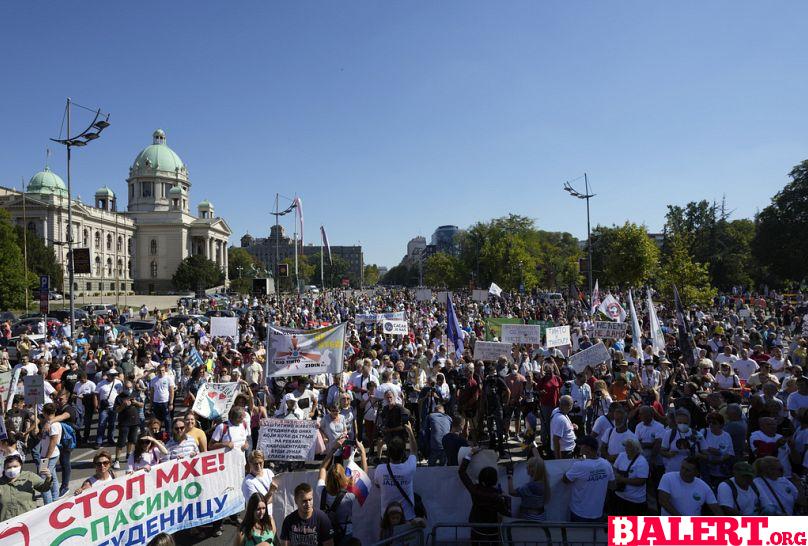
For Europe’s transition to green energy, the prospect of a significant lithium supply located at the heart of the continent is a reassuring development. Currently, most of the lithium utilized in Europe is sourced from Asia and South America. The COVID-19 pandemic, Russia’s invasion of Ukraine, and other global supply chain disruptions have highlighted the risks associated with reliance on distant supplies. Consequently, Europe has been eager to secure strategic resources closer to home. While mining opportunities exist in countries like Germany, Finland, Spain, Portugal, and the UK, Serbia’s project, which has been underway for two decades, is well ahead of the competition. Rio Tinto has already invested approximately $450 million (€415 million) in this endeavor.
However, as is often the case with mining projects, Serbia’s lithium initiative has faced significant challenges. The initial public outcry erupted when Rio Tinto acquired land and received governmental approval to commence mining operations. Politicians, environmentalists, and activists raised alarms over potential pollution, arguing that the unfamiliar processes involved could contaminate the region’s pristine waterways and soil. The backlash led to massive demonstrations and road blockades, catching both Rio Tinto and the government, which was approaching a pre-scheduled early election, off guard. In January 2022, licenses were revoked, effectively putting the project on hold.
Yet, the memorandum of understanding signed in Belgrade last week has breathed new life into the project.
A Quantum Leap into the Future
Both Serbian President Aleksandar Vučić and his European counterparts expressed their enthusiasm for the economic potential of the lithium project. Vučić acknowledged that while there remains a long way to go before the mine opens, the process will be transparent and devoid of hidden agendas. He stated, “This is crème de la crème of the European industry, and it is clear that we have brought Europe to Serbia.” He further expressed, “This day fills me with hope for our country. It is important for Europe, for Germany, but above all, for Serbia. It will mark a turning point, a great change, a quantum leap into the future.”
German Chancellor Olaf Scholz echoed these sentiments, portraying the initiative as a pathway for Serbia’s integration into Europe. “I must add that this is indeed a European project,” he remarked at the summit. “We need a European spirit, which is crucial for the future. I would connect my presence here with the clear support for the European integration of the Western Balkan countries.”
The potential for job creation is significant; upon completion, the mine is expected to employ 2,100 workers directly. However, concerns linger regarding whether these jobs are worth the environmental risks. Summit participants attempted to address public fears, particularly the apprehension that Serbia might sacrifice its environment for low-wage mining jobs and minimal financial returns from the mining fee, which stands at just 5% for the extracted metals. A viral social media post in Serbia depicted a frail child in tattered clothing, kneeling in the mud of an African diamond mine, captioned: “The kind of prosperity that mining for Europeans brings.”
Moreover, the Austrian newspaper Der Standard published an opinion piece criticizing Scholz for forging a deal with Vučić, suggesting that a new Western colony had emerged in the Balkans. The EU itself has recently scrutinized Vučić’s government, raising concerns about the rule of law in this EU candidate country and highlighting irregularities in the latest general elections.
To assuage public concerns, Vučić has vowed to prohibit the export of lithium from Serbia, stipulating that all entities wishing to utilize Serbian lithium must establish factories within the country. European attendees at the summit appeared supportive of this approach, with the term “value chain” becoming a recurring theme during discussions.
- “This project creates a new potential value chain and secures the possibility to create new jobs, not only in mining but in subsequent processing stages,” Scholz stated.
- “It connects Serbia to the future of mobility, which must be carbon-free. We are discussing a turning point for the mobility of the future,” he added.
- Vučić echoed these sentiments, asserting that the project would attract “at least €6 billion in new investment to Serbia.”
Furthermore, the UK ambassador to Serbia, Edward Ferguson, expressed confidence in the deal, stating it would transform Serbia into a green technology hub. “We are helping Serbia to acquire more than just lithium,” he noted. “We are examining how to build the value chain, ensuring that after lithium extraction, we have facilities for processing it into cathodes for batteries that will power the next generation of electric vehicles.”
Progress and Concerns: Can Lithium Mining Be Green?
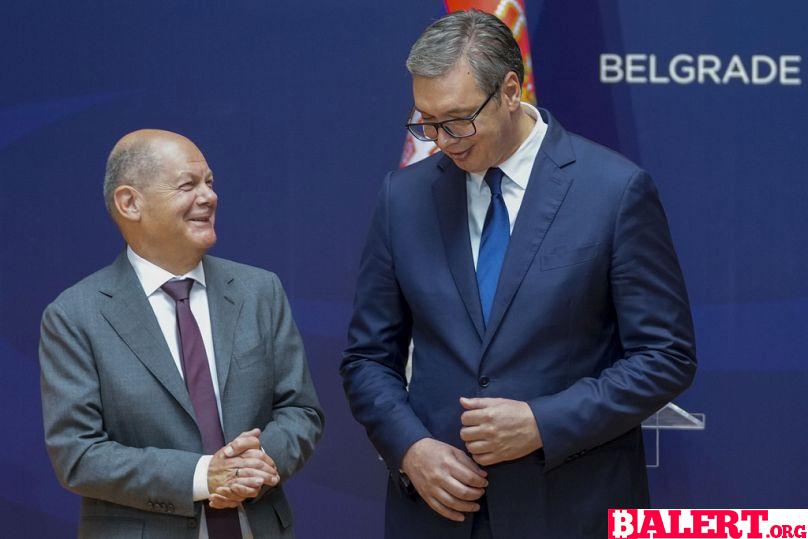
Just days after the summit, another event in Serbia highlighted the potential of the value chain. In Kragujevac, often referred to as “Serbian Detroit” due to its automotive industry, Stellantis inaugurated a new production line and launched the first electric vehicle manufactured in Serbia, the Fiat Grande Panda. This production line will create 2,000 jobs. Stellantis’ executive director, Carlos Tavares, acknowledged the significance of the new lithium deal in relation to their operations. “The biggest weakness of electric cars is their affordability,” he stated. “So, I believe this is a positive development, and we are keen to be part of this initiative.”
However, the shadow of concern that previously mobilized the Serbian public against lithium mining still lingers: can the extraction of lithium be conducted without incurring severe environmental consequences? During the summit in Belgrade, all eyes were on assurances from Europe regarding the ecological sustainability of mining practices. Participants were acutely aware of this concern.
Šefčovič emphasized that the EU’s “clear intention” is to uphold the “highest environmental standards.” He stated, “We possess the most comprehensive regulatory framework. Each battery will have a passport—a QR code providing access to information on its carbon footprint, recycling guarantees, and the fair treatment of individuals in the value chain.”
Scholz underscored that the EU’s involvement would extend beyond mere regulatory frameworks. “We are not here merely to incentivize but to engage as partners in implementing environmentally responsible solutions, utilizing the expertise of our mining engineers,” he explained. “We will share the knowledge our experts have amassed over centuries, ensuring the success of our joint endeavor.”
The Chancellor assured that he had communicated to Rio Tinto executives that the project would only move forward if it complied with the highest environmental standards, receiving assurances to that effect. While environmentalists and local organizations in the Jadar region remain skeptical, fearing that water and food resources are Serbia’s true strategic assets, the Serbian government continues to grant exploration licenses to various mining companies, indicating that the lithium project is progressing at a rapid pace.
World
Dominique Pelicot Testifies in Harrowing Rape Trial
Join us as Dominique Pelicot courageously testifies in a harrowing rape trial, shedding light on the complexities of trauma and justice. Her powerful story raises crucial questions about the legal system and the importance of support for survivors.

Dominique Pelicot Takes the Stand in Shocking Rape Trial
In a courtroom drama that has captivated France and garnered international attention, Dominique Pelicot, the man at the center of a harrowing rape trial, finally addressed the court. With tears streaming down his face, he recounted how his wife had been instrumental in helping him cope with a tumultuous past marked by trauma. He revealed that he had endured a sexual assault at the tender age of nine while hospitalized, and he also witnessed a gang rape during his teenage years while working as an apprentice electrician on a construction site.
“She didn’t deserve this, I acknowledge that,” Mr. Pelicot stated, his voice barely audible as he struggled to convey his emotions. The gravity of the situation weighed heavily on him, and the courtroom fell silent, straining to catch his every word.
Now 71 years old, Mr. Pelicot faces serious allegations of drugging his wife, Gisèle Pelicot, whom he has been married to for half a century, over a span of nearly ten years. Prosecutors contend that he used drugs to render her comatose, allowing him to rape her repeatedly. Furthermore, authorities allege that he went so far as to invite numerous men into their home, facilitating a nightmarish scenario where they, too, engaged in the assault of his wife.
Overall, 51 men, including Mr. Pelicot, are on trial concurrently, primarily facing charges related to the aggravated rape of Ms. Pelicot. Among them, one individual has already pleaded guilty to similar crimes, admitting to drugging his own wife to assault her and inviting Mr. Pelicot to partake in the horrific act while she was incapacitated.
Mr. Pelicot’s unexpected testimony came after a tumultuous start to the trial. Just a week in, he was stricken with severe health issues that forced him to miss four consecutive days in court. The head judge ultimately decided to postpone proceedings, as Mr. Pelicot was diagnosed with kidney stones, a kidney infection, and prostate complications, adding yet another layer of complexity to this already harrowing case.
World
Meta Bans Russian State Media Outlets from Social Media Platforms
Explore the implications of Meta’s decision to ban Russian state media outlets from its social media platforms. Understand the impact on information dissemination and the ongoing battle against misinformation in the digital landscape.

Meta Imposes Global Ban on Russian State Media Outlets
In a significant move, Meta Platforms, Inc., the parent company of Facebook, has announced the prohibition of Russian state media outlets, including RT (Russia Today) and Rossiya Segodnya, from all its social media platforms. The decision stems from the company’s concerns regarding the deceptive strategies employed by these media organizations to execute covert influence operations across the internet.
Meta made this announcement on Monday, emphasizing that the ban will be enforced worldwide across its various platforms, such as Instagram, WhatsApp, and Threads. The rollout of this ban is expected to take place over the coming days.
Statement from Meta
A spokesperson for Meta elaborated on the decision, stating, “After careful consideration, we have expanded our ongoing enforcement actions against Russian state media outlets. As a result, Rossiya Segodnya, RT, and other affiliated entities are now banned from our applications globally due to their involvement in foreign interference activities.”
For further insights into this development, watch the video in the player above.
World
Trump Recalls Alleged Assassination Attempt While Golfing
Explore Donald Trump’s chilling recollection of an alleged assassination attempt he experienced while enjoying a round of golf. Delve into the tense moments and his reflections on safety, fame, and the unpredictability of public life.

In a recent interview on the social media platform X, Republican presidential nominee Donald Trump recounted a harrowing incident he claims to have experienced while playing golf. Trump described how, during a peaceful Sunday morning round with friends, the tranquility of the day was abruptly shattered by the sound of gunfire in the air.
“It was a beautiful day, everything was just perfect,” Trump reflected. “Then all of a sudden, we heard shots being fired—probably around four or five in total.” He went on to explain that a Secret Service agent was the first to spot the suspect, who was allegedly armed with an AK-47, a powerful assault rifle.
“The agent saw the barrel of the weapon and immediately took action, returning fire at the barrel and aiming in the direction of the bushes,” Trump detailed. “I would have loved to have sunk that last putt, but we decided it was best to leave the scene promptly.”
Trump expressed his gratitude towards the agents and a vigilant civilian who aided in tracking down the suspect, who was eventually apprehended following a high-speed chase.
Suspect Faces Multiple Federal Gun Charges
The FBI has identified the suspect as Ryan Wesley Routh, accusing him of targeting Trump during his time at the golf club in West Palm Beach, Florida. According to an FBI report, Routh had allegedly hidden among the hedges of the golf course for an astonishing 12 hours. Authorities discovered an SKS-style assault rifle, a GoPro camera, and a bag of food at the scene.
The 58-year-old Routh is now facing two serious federal gun charges. If convicted on both counts, he could face a combined maximum sentence of 20 years in prison. Notably, neither of the charges is directly related to an assassination attempt. The first charge pertains to possessing a firearm despite a prior felony conviction, which carries a potential 15-year sentence, a fine of $250,000 (€225,000), and three years of supervised release.
The second charge involves possession of a firearm with an obliterated serial number, which could result in a five-year prison term, the same financial penalties, and also three years of supervised release. As the investigation continues, additional charges could be forthcoming.
While the motive behind Routh’s actions remains unclear, his digital footprint reveals strong political affiliations, particularly concerning issues surrounding Ukraine and China. Routh consistently expressed support for Ukraine across various social media platforms, even claiming to have orchestrated a recruitment scheme for international volunteers aiming to assist Ukraine in its fight against Russia’s invasion. This behavior has been denounced by Ukrainian soldiers and members of the International Legion, who disavowed Routh’s actions and motives.
-

 Business4 months ago
Business4 months agoObituary: Dan Collins
-

 Business3 months ago
Business3 months agoThe Significance of Jackson Hole: A Central Banking Tradition
-

 Gaming5 months ago
Gaming5 months agoMore than a thousand students vowed not to work for Amazon and Google due to the Nimbus Project.
-
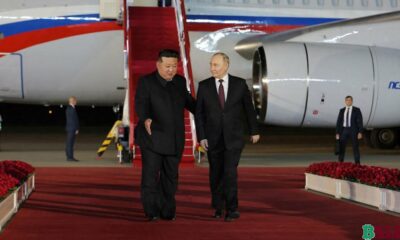
 World5 months ago
World5 months agoRussia and North Korea Strengthen Defense Ties
-

 Business5 months ago
Business5 months agoJump Crypto Invests $10 Million in Pro-Crypto PAC
-

 Article5 months ago
Article5 months agoCreative Design Applications Developed with Artificial Intelligence
-

 Tech2 months ago
Tech2 months agoNew Leaks and Features About the Samsung Galaxy S25 Ultra
-

 Gaming5 months ago
Gaming5 months agoThe Inspirational Success Story of Avon’s Founder Who Sold Books Door to Door














